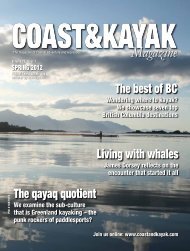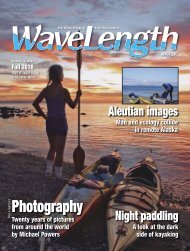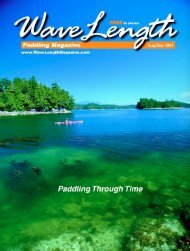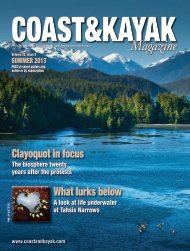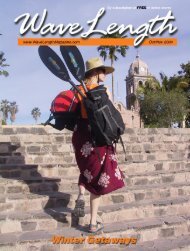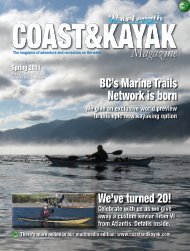download - WaveLength Paddling Magazine
download - WaveLength Paddling Magazine
download - WaveLength Paddling Magazine
Create successful ePaper yourself
Turn your PDF publications into a flip-book with our unique Google optimized e-Paper software.
Many outboards use fuel tanks filled to 23 liters. Imagine five<br />
one-liter containers of gas and oil deposited in the water with each<br />
23 liter tank of fuel burned. Then, decommission that engine and<br />
replace it with a four stroke motor or an oil-injected two stroke. The<br />
California Air Resources Board (CARB) has created a rating system<br />
regarding engine emissions from one to four stars. One star engines<br />
have 75% lower emissions than conventional two stroke engines.<br />
Four star engines have 90% lower emissions than one star engines,<br />
and you can find them on inboards and stern drives as well.<br />
Regardless of which sort of motor you run, be sure that it’s<br />
properly maintained. The more fuel consumed, the more exhaust<br />
goes into the water or air. And keep oil absorbing pads handy.<br />
Most bilge pumps turn on automatically. An oil absorbing pad<br />
kept in the bilge will absorb the oil and fuel that settles there. This<br />
way, when the pump turns on, the water goes overboard while<br />
the hydrocarbons stay in the pad. Pads are handy for wiping up<br />
hydrocarbon spills before they settle in the bilge too, so keep them<br />
ready whenever you fill your fuel tanks.<br />
BASE CAMP<br />
Having the comforts of home without having to camp may be<br />
what enticed you into having a mothership. Your on-board toilet<br />
(‘head’) is one of those comforts, but it you’re visiting sensitive spots,<br />
those ‘direct deposits’ have direct impacts.<br />
You will eventually need either a holding tank or a treatment<br />
system called a marine sanitation device (MSD) on board. Holding<br />
tanks or MSDs are required in US waters. An increasing number<br />
of areas in the US are designated ‘No Discharge Zones’ where<br />
you can’t pump even treated sewage overboard. Laws in Canada<br />
are changing to require holding tanks here in a few years as well.<br />
Meanwhile, if the boat has a head that discharges straight overboard,<br />
use a portable toilet in lieu of that sort of loo when you’re in low<br />
current areas, shallow areas or most marinas. Holding tanks and<br />
portable toilets should be pumped out at a pump-out station. If<br />
you’re too far from a station, they should be discharged into a heavy<br />
current area. Before you pump overboard into a sweet little cove<br />
thinking it won’t matter since you’re the only one there, remember<br />
that yours is not the first or last vessel to visit. Anybody who swims<br />
or eats shellfish is trusting other boaters to be responsible regarding<br />
sewage discharge.<br />
The grey water that comes out of your galley and shower can also<br />
be a problem depending on what you add to it. Pay attention to the<br />
soaps and cleansers you use. Fresh water fish die in chlorinated<br />
tap water. Chlorine hurts salt water species too and is found in<br />
many cleaning products, in even greater concentrations than in<br />
chlorinated tap water. Marine life is sensitive to many compounds<br />
that we routinely use such as dish soap and laundry detergent.<br />
Avoid use of any products containing chlorine or phosphates and ➝<br />
One kit, 60 hours,<br />
a lifetime of<br />
ADVENTURE<br />
Sea Wolf Wooden Kayak Kits are for the<br />
discriminating paddler who prefers the<br />
beauty, light weight and efficiency of a<br />
wooden kayak.<br />
• Kits include only the highest<br />
quality materials.<br />
• Easily built by anyone with<br />
limited woodworking<br />
experience.<br />
• These kayaks will<br />
last a lifetime<br />
and beyond.<br />
You can<br />
proudly say<br />
“I built it<br />
myself”<br />
ROY FOLLAND WOODEN KAYAKS<br />
130 Como Gardens, Hudson,<br />
Quebec, J0P 1H0<br />
(450) 458-0152<br />
Email: kayak@royfolland.com<br />
www.royfolland.com<br />
June/July 2004 www.<strong>WaveLength</strong><strong>Magazine</strong>.com<br />
23



